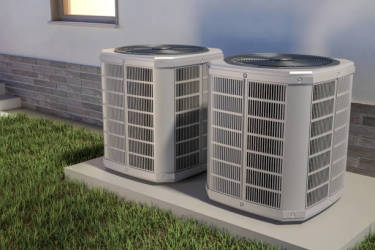Boiler Upgrade Scheme
To help the UK government meet its target of making the UK net zero by 2050, the government is providing grants of up to £6,000 towards a low-carbon heating system. Continue reading to find out more about what heating systems are available, if you are eligible for a grant, and how to apply.
Last updated - 24/10/2022
Estimated reading time - 5 minutes
What is the Boiler Upgrade Scheme?
The Boiler Upgrade Scheme (BUS) is a UK government initiative that provides grants to homeowners to offset the initial upfront cost of installing low-carbon heating systems such as heat pumps and biomass boilers.
The Boiler Upgrade Scheme is available to all domestic and non-domestic properties in England and Wales and runs from 2022 to 2025. During these three years, £450 million of grant funding will be made available to property owners on a first come, first served basis.
The scheme is administered by Ofgem. Ofgem will be responsible for processing grant applications and will make payments to the installers following successful applications.
What is a low-carbon heating system?
Currently, the majority of UK households use carbon-emitting fossil fuels such as gas or oil to heat their homes. These fossil fuels have a negative effect on the environment and on our climate.
According to the Committee on Climate Change, around 14% of the UK’s carbon emissions come from heating our homes. The Boiler Upgrade Scheme will be a key driver in meeting the government's objective of making the UK net zero by 2050 and will also help to ensure all new heating system installations will be low carbon by 2035.
Net zero means achieving a balance between the carbon emitted into the atmosphere and the carbon removed from it. Net zero will be achieved when the amount of carbon we add to the atmosphere is less than or equal to the amount removed.
Not only will installing a low-carbon heating system produce fewer greenhouse gases, but it could also reduce a household’s energy bills.
What low-carbon heating systems are available under the Boiler Upgrade Scheme?
The Boiler Upgrade Scheme provides grants for installing the following low-carbon heating systems:
- Air source heat pumps - A heating system that converts thermal energy (heat) from the outside air into heat for your property.
- Biomass boilers - A heating system that uses natural/non-fossil fuel resources to create heat for use throughout your property.
- Ground source heat pumps - A heating system that extracts heat from the ground to heat your property.


Please note, for any heat pump to be eligible for the grant, it must have a seasonal coefficient of performance of at least 2.8. Your chosen installer will be able to provide you with more details
It is also important to note that, in this instance, the Boiler Upgrade Scheme includes water source heat pumps within the same category as ground source heat pumps. Water source heat pumps extract heat from a body of water and converts it into energy to heat your property.
Biomass boilers are only eligible for this scheme if they are in rural locations (ones with fewer than 10,000 residents) and in properties that are not connected to the gas grid.
How much money will I get towards a low carbon heating system?
The Boiler Upgrade Scheme provides funding in the form of a grant of up to £6,000 towards the cost and installation of a new low-carbon heating system.
Grants are to be applied for by your chosen heating system installer. The grant will then be discounted from the total purchase and installation cost.
Depending on your eligibility, you may be able to claim the following:
- £5,000 off the cost and installation of an air source heat pump
- £5,000 off the cost and installation of a biomass boiler
- £6,000 off the cost and installation of a ground source heat pump
What is the typical cost of a low-carbon heating system
Heat pump prices vary considerably, you can purchase an air source heat pump from around £2,500. The average cost of buying and installing an air source heat pump is between £7,000 and £15,000 while the cost and installation of a ground source heat pump can cost up to £20,000.
The cost and installation of a biomass boiler depends on the type you are installing. A manually-fed biomass log boiler might cost between £5,000 and £12,000, whereas an automatically-fed biomass pellet boiler can cost up to £25,000.
Am I eligible for the Boiler Upgrade Scheme?
To be eligible for the Boiler Upgrade Scheme, you must meet the following requirements:
Owner eligibility
- You must own the property you are applying for. This can be a home or a small non-domestic property, i.e., a small business
- You live in England or Wales
Property eligibility
- The property must have a current energy performance certificate (EPC), with no outstanding recommendations for loft or cavity wall insulation. If the property does have outstanding recommendations, you will need to have the work done before applying.
To check your property's EPC report, click here.
- An installation capacity up to 45kWth (this covers most homes). Your chosen installer will be able to advise you on this.
Grants are available for:
- Social housing
- New build properties (apart from some self-build new properties)
- Properties that have already had government funding or support for a heat pump or biomass boiler
Self-build properties must have:
- Been built using the labour or resources of the first owner
- Not be owned by a business or organisation
Technology eligibility
For your chosen low carbon heating system to be eligible for the Boiler Upgrade Scheme, it must:
- Be commissioned on or after 1st April 2022
- Fully replace an existing fossil fuel system, i.e., an oil or gas boiler
- Meet the full space heating and hot water demands of the property
How can I apply for the Boiler Upgrade Scheme?
If you are interested in receiving a grant for a low-carbon heating system under the Boiler Upgrade Scheme, you will have to follow these steps:
Contact an MSC certified installer. MSC is an organisation that certifies low carbon products, installers and their installations.
To find an MSC certified installer, click here.
- Once you have found an MSC installer, they will advise you on whether your installation is eligible for a grant under the Boiler Upgrade Scheme.
- If you are eligible for the grant, the installer will discuss which low-carbon heating system is best suited to your property and needs.
- Once you and the installer decide on which heating system will be installed, they will give you a quote for the cost and labour of installing the chosen system. The grant from the Boiler Upgrade Scheme should be deducted from the total amount.
- The installer will apply for the grant on your behalf.
- Ofgem will contact you to confirm that the installer is applying for the grant on your behalf.

